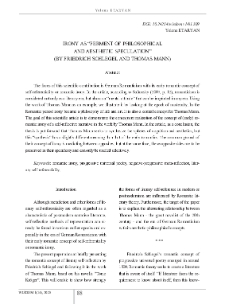Object
Title: Irony As “Ferment Of Philosophical And Aesthetic Speculation” (By Friedrich Schlegel And Thomas Mann)
Journal or Publication Title:
Date of publication:
Volume:
Number:
ISSN:
Corporate Creators:
Խ․ Աբովյանի անվան հայկական պետական մանկավարժական համալսարան
Coverage:
Abstract:
The focus of this scientific contribution is German Romanticism with its early romantic concept of self-referentiality or romantic irony. In the article, according to Safransky (2007, p. 12), romanticism is considered not only as a literary era, but also as a ―mental attitude‖ that can be imprinted in any era. Using the work of Thomas Mann as an example, we illustrate it by looking at the epoch of modernity. In the Romantic period irony became a philosophy of life and art. It is also a central concept for Thomas Mann. The goal of this scientific article is to demonstrate the consequent realization of the concept of (early) ro-mantic irony of a self-reflective narrative in the work by Thomas Mann. In the article, as a conclusion, the thesis is put forward that Thomas Mann seeks to synthesize the spheres of cognition and aesthetics, but this ―synthesis‖ has a slightly different meaning than that of the early romantics. The common ground of their concept of irony is mediating between opposites, but at the same time, these opposite sides are to be preserved in their specificity and can only be unified selectively.
Place of publishing:
Երևան
Publisher:
Format:
Identifier:
oai:arar.sci.am:370633
Language:
Object collections:
Last modified:
Oct 8, 2025
In our library since:
Feb 27, 2024
Number of object content hits:
69
All available object's versions:
https://arar.sci.am/publication/400462
Show description in RDF format:
Show description in OAI-PMH format:
-
Իմաստություն=Wisdom=Мудрость
-
Իմաստություն, 2013, N 1
-
Իմաստություն, 2014, N 1 (2)
-
Իմաստություն, 2014, N 2 (3)
-
Իմաստություն, 2015, N 1 (4)
-
Wisdom, 2015, N 2 (5)
-
Wisdom, 2016, N 1 (6)
-
Wisdom, 2016, N 2 (7)
-
Wisdom, 2017, N 1 (8)
-
Wisdom, 2017, N 2 (9)
-
Wisdom, 2018, N 1 (10)
-
Wisdom, 2018, N 2 (11)
-
Wisdom, 2019, N 1 (12)
-
Wisdom, 2019, N 2 (13)
-
Wisdom, 2020, N 1 (14)
- Editorial board
- Content
- Editor`s Foreword
- Communication Noise as a Discourse Component
- Digitalization Of Communication And The Spiral Of Silence Theory
- Epistemological Foundations Of Early Legal Utilitarianism
- Linguophilosophical Aspect of Communicative Influence: Theoretical Basis
- On The Perceptual, The Conceptual, The Objectively Real And The Problem Of Truth In Cosmogony And Cosmology
- Intellectual Analysis For Educational Path’ Cognitive Modeling: Digital Knowledge forPost-Modern Value Creation
- Psycho-Pedagogical Resources And The Quality Of Professional Training Of Students
- Irony As “Ferment Of Philosophical And Aesthetic Speculation” (By Friedrich Schlegel And Thomas Mann)
- A Theoretical-Practical Analysis of Philosophical and Psychological Aspects of Human Resources Management
- National Value System Impact On The Economy Of Armenia
- Scientific And Educational Technologies In Human Capital Formation
- Aggression as a Crime in International and National Criminal Law
- Freedom Of Thought: Legal Protection From Manipulation
- Patriotism And Armenian Statehood In The Norms Of Armenian Law
- Features Of Fundamental Rights In The Context Of The Philosophy Of Law
- Surrealism Between Psychological Investigation And Artistic Commitment
- Notes to Contributors
- Authors
-
Wisdom, 2020, N 2 (15)
-
Wisdom, 2020, N 3 (16)
-
Wisdom, 2021, N 1 (17)
-
Wisdom, 2021, N 1 (1) Special issue
-
Wisdom, 2021, N 2 (18)
-
Wisdom, 2021, N 3 (19)
-
Wisdom, 2021, N 4 (20)
-
Wisdom, 2022, N 1 (21)
-
Wisdom, 2022, N 1 (2) Special issue
-
Wisdom, 2022, N 2 (22)
-
Wisdom, 2022, N 2 (3) Special issue
-
Wisdom, 2022, N 3 (23)
-
Wisdom, 2022, N 3 (4) Special issue
-
Wisdom, 2022, N 4 (24)
-
Wisdom, 2023, N 1 (25)
-
Wisdom, 2023, N 2 (26)
-
Wisdom, 2023, N 3 (27)
-
Wisdom, 2023, N 4 (28)
-
Wisdom, 2024, N 1 (29)
-
Wisdom, 2024, N 2 (30)
-
Wisdom, 2025, N 1 (31)
-
Wisdom, 2025, N 2 (32)
-
Իմաստություն, 2013, N 1
| Edition name | Date |
|---|---|
| Etaryan, Yelena, Irony As “Ferment Of Philosophical And Aesthetic Speculation” (By Friedrich Schlegel And Thomas Mann) | Oct 8, 2025 |





